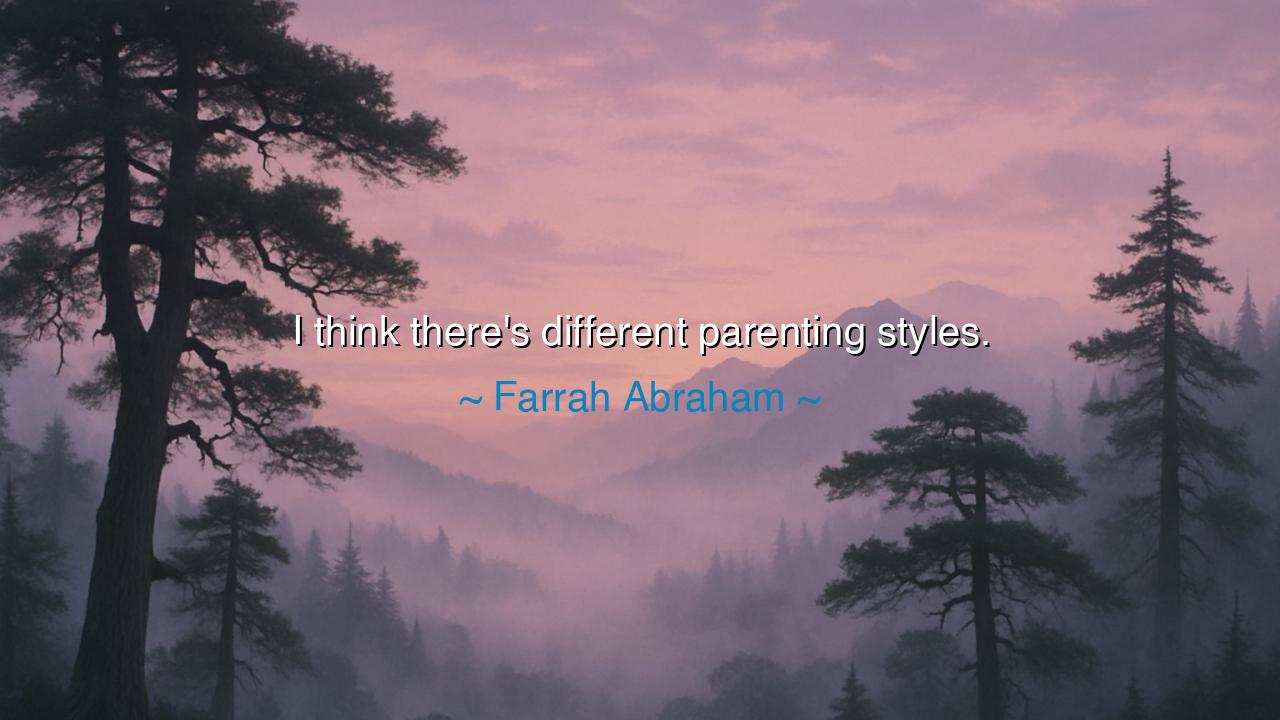
I think there's different parenting styles.






When Farrah Abraham spoke the simple words: “I think there’s different parenting styles,” she gave voice to a truth as old as the generations. For in every age, across every land, men and women have raised their children in ways shaped by their culture, their struggles, their hopes, and their fears. There is no single road to raising a child, but many paths that wind through the forest of life. Her words remind us that parenting is not one law but a vast landscape of methods, each reflecting the heart of those who walk it.
The origin of this truth lies in the diversity of humanity itself. In ancient tribes, some raised their children in strict discipline, preparing them for war or hardship. Others raised their children in gentleness, surrounding them with stories and rituals that nurtured the soul. The Spartans trained their youth in endurance and obedience, for their survival depended on strength. The Athenians, by contrast, taught their children music, philosophy, and debate, for their city prized the art of words and ideas. Both were parents, both loved their children, yet their styles could not have been more different.
Abraham’s words remind us that even within the same household, parenting may take many forms. One parent may teach through firmness, another through patience. One child may require structure, another may flourish under freedom. What matters is not that all parents follow the same method, but that each method flows from love, and that it seeks to prepare the child for life’s great challenges. Just as a gardener tends each plant according to its needs, so must parents adapt their styles to the unique nature of their children.
Yet the simplicity of her words also carries a warning. For though different parenting styles exist, not all lead to flourishing. Some may shelter too tightly, suffocating growth. Others may neglect too greatly, leaving children adrift. The wisdom of the ancients tells us that virtue lies in balance: to give both freedom and guidance, both tenderness and discipline. The parent who leans too far to one side risks either crushing or abandoning the soul of the child. To acknowledge different styles is not to say all are equal, but to remember that love must always guide the choice.
The emotional depth of this teaching is clear: parenting is not merely technique, but the transmission of values. Behind every style lies a vision of the future — what kind of human the parent wishes to see rise from the child. Some dream of warriors, others of thinkers, others of compassionate souls. Thus, every choice a parent makes — whether strict or permissive, structured or free — is rooted in a dream for the child’s destiny. Abraham’s words, though modest, echo this great truth: parenting styles differ because dreams differ.
The lesson for us, O listener, is this: respect the diversity of parenting styles, but discern wisely. Do not scorn the ways of others, for they too are born of love, but also do not follow blindly. Seek to understand your child and the life they must face. Ask not only, “What style do I prefer?” but “What does my child need to grow in strength, wisdom, and love?” For the greatest parent is not the one who follows a single style rigidly, but the one who adapts with patience and humility, guided always by care for their child’s soul.
Practical actions must follow: parents should study and reflect on different approaches, drawing wisdom where they find it, but tailoring their choices to the uniqueness of their family. They must balance discipline with compassion, freedom with responsibility. Communities should honor this diversity, offering support rather than judgment. And children, as they grow, should be taught to understand that their parents’ ways were shaped not only by tradition but by love and circumstance.
So let Farrah Abraham’s simple declaration be remembered as timeless wisdom: there are different parenting styles, because there are different children, different families, different destinies. What unites them all, when done rightly, is love. The style may differ, the methods may change, but the heart remains the same — to raise the young not only to survive, but to live fully, bravely, and wisely in the world.






AAdministratorAdministrator
Welcome, honored guests. Please leave a comment, we will respond soon